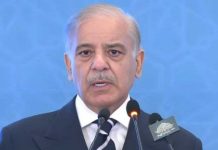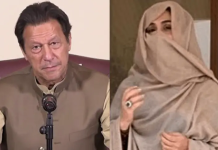ISLAMABAD, NOV 12: The National Assembly session resumed on Wednesday with the lower house expected to pass the 27th Constitutional Amendment Bill, tabled by Law Minister Azam Nazeer Tarar on Tuesday.
The proposed tweaks require a two-thirds majority in the 336-member National Assembly for passage. The ruling coalition appears well-positioned to secure the numbers, with the PML-N holding 125 seats, the PPP 74, MQM-P 22, PML-Q four, Istehkam-e-Pakistan Party four, and one seat each held by the PML-Z, Balochistan Awami Party (BAP), and National Peoples Party.
The 59-clause amendment, passed by the Senate on Monday, seeks to overhaul the country’s military and judicial structures. It was moved by the law minister and secured 64 votes in the 96-member House, with no votes against it, as opposition lawmakers boycotted the proceedings and tore up their copies in protest.
Apart from treasury members, ANP’s senators, PTI-backed Saifullah Abro, and JUI-F’s Ahmed Khan also supported the bill. In a surprise move, Abro refrained from joining the protest and later announced his resignation from the Senate.
Achakzai tears copy of bill
As the National Assembly session began today, NA Speaker Ayaz Sadiq referred to the agenda on the 27th Amendment bill and gave the floor to PkMAP chief Mahmood Khan Achakzai.
Addressing the lower house, Achakzai criticised the government, saying it was formed under “Form 47” and questioned the legitimacy of members who had narrowly won elections.
He challenged whether such a parliament should have the authority to amend the Constitution. Achakzai tore a copy of the 27th Constitutional Amendment Bill in the House.
NA speaker reiterates dialogue offer
During the session, National Assembly Speaker Sardar Ayaz Sadiq once again offered opposition parties to hold dialogue with the government.
“As speaker of the National Assembly, I am ready to facilitate negotiations between the government and the opposition. If both sides sit together, solutions will emerge,” he added.
The NA speaker reiterated that Prime Minister Shehbaz Sharif had repeatedly invited the opposition for talks, offering to facilitate dialogue to find solutions.
“Even if nothing comes out on the first day, continuing talks will yield results. My role is to bring the government and opposition to the negotiation table,” said Sadiq.
PTI Chairman Barrister Gohar Ali Khan, while replying to the NA speaker’s dialogue offer, said the party “never gave up on dialogue” and requested permission for KP CM Sohail Afridi to meet PTI founding chairman Imran Khan in jail.
‘Bill can be tabled in Senate again’
While talking to the media, the law minister said voting on the amendment will take place in the house today.
“If any changes are needed, it can be presented in the Senate. If there is any ambiguity, it is better that it is discussed.”
“Only the parliament has the power to amend the Constitution. The constitutional court cannot rewrite it,” he added.
Tarar slams PTI
Information Minister Attaullah Tarar criticised the opposition on Wednesday for rejecting the 27th Constitutional Amendment Bill, accusing them of “selective memory” and “double standards.”
Referring to speeches made by opposition members, Tarar said it appeared they “could not recall anything before 2022” — the year former prime minister Imran Khan was ousted.
He accused the PTI of accepting “fascism” when in power but opposing parliamentary procedures now. “When Parliament — the highest institution — tries to pass a constitutional amendment through legal means and consultation, they have a problem with it,” he said.
“This selective morality, selective justice, double standards — what exactly is their politics other than this?” Tarar questioned.
Tarar accused PTI’s Shehryar Afridi of failing to suggest any “improvements” to the proposed amendment and criticised the party for constantly raising the Form-47 issue after the 2024 general elections.
Highlights of new amendment
Chief of Army Staff to assume role as Chief of Defence Forces
Field Marshal, Marshal of Air Force, Admiral of Fleet titles to remain for life
Federal Constitutional Court to be established
Equal provincial representation approved in Federal Constitutional Court
FCC empowered to take suo motu notice upon petitions
Islamabad High Court to have one judge on FCC bench
President and prime minister to play a key role in judicial appointments
Supreme Court powers to be reduced, with some authorities shifted to the new court
Presidential immunity limited if president assumes any public office after tenure
Judges must serve five years in high court for eligibility of Constitutional Court
Judicial Commission to decide transfer of high court judges
Objections on transfers to be reviewed by Supreme Judicial Council

















